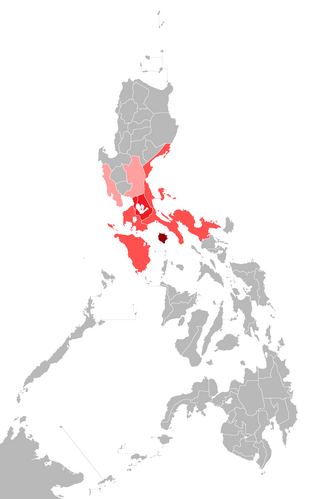Tagalog language
Austronesian language; native language of the Tagalog ethnic group From Wikipedia, the free encyclopedia
Remove ads
Tagalog[3] is one of the main or major local and regional languages in the Philippines, and it is "in practice" but not "according to the law" the basis, foundation or core of the current national language and one of the two official languages of the Philippines, which is named, declared, and called the Filipino language. More than 22 million people speak Tagalog as their first language.
Tagalog was originally spoken by the Tagalog people in the Philippines, who were mainly in most of the central and southern parts of Luzon, the northern island chain of the Philippines.
Today, Tagalog is spoken nationwide and used by other Filipinos as a second language and by most Filipinos from different parts of the Philippines to understand one another.
The Filipino language is a language that continues to undergo evolution and development from the Pilipino language since 1987. It has more influences from the other languages of the Philippines and foreign languages than the core Tagalog language.
The Pilipino language since 1959 has been the final official name of the former or previous official and national language of the Philippines. It is one of the two official languages of the Philippines, with English being the other.
Filipino originally was used with an abugida writing system, Baybayin, but the Latin alphabet is now used, especially the former or previous abakada (type of alphabet), which ahd 25 letters and the current Filipino alphabet, which has 28 letters.
Remove ads
Sample phrases
- Magandang Umaga! - Good Morning!
- Magandang Gabi! - Good Evening!
- Magandang Tanghali! - Good Afternoon!
- Kumusta!/Kamusta? - How are you?/Hello! (Informal)
- May ______ ba kayo? - Do you have ______?(Formal)
- Mayroon po: Response to "May ______ ba kayo", meaning "Yes, sir".
- Wala po - Opposite of "Mayroon po".
- Kayo - you (formal), informally, it refers to "you all".
- Magkano ito? - How much is this?
- po: ma'am or sir (used in sentences to be polite to an elder speaker)
- Mabuhay! - Long Live
- Ako po si (Pangalan)... - I am (Name)...
- Mahal kita - I love you
- Nanay - Mom
- Tatay - Dad
- Hindi - No
- Bakit? - Why?
- Saan? - Where?
- Ano? - What?
- Kailan? - When?
- Sino? - Who?
Remove ads
Related pages
References
Other websites
Wikiwand - on
Seamless Wikipedia browsing. On steroids.
Remove ads

